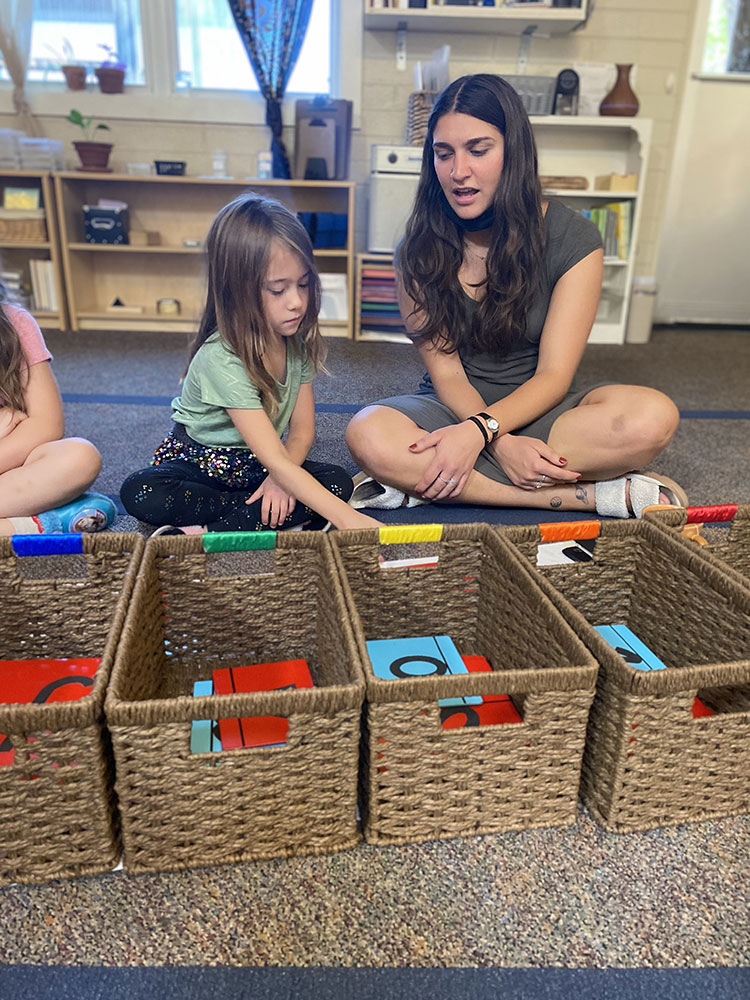Montessori Philosophy
Philosophy
We adhere to the principles and philosophy of educator Dr. Maria Montessori, while incorporating the work of others in fields of developmental psychology and education. We observe and follow the child to aid each in realizing his or her unique potential. Our school environments are prepared for developmental age groupings, with concrete educational materials and aids to the imagination. We honor diversity and strive to create situations in which the expression of differences leads to understanding and appreciation. First and foremost, our responsibility is to the children – providing for them an atmosphere of trust with opportunity for choice and where work is expected and respected.
As an AMS affiliated Montessori school, we follow the core components of the American Montessori Society, including:

Multi-age Classroom
Our students are grouped into classrooms by developmental stages.
Young
Children
18 months through 3 years old
Primary Program
3 years old through charter kindergarten
Lower Elementary
1st through 3rd grade
Upper Elementary
4th through 6th grade
Middle School
7th and 8th grade
This arrangement works for the advantage of all the children, instilling in them a sense of community and mutual aid, naturally replacing competition. In practice, the younger children keenly observe the activities of and are often taught by the more mature and experienced older children. The older children benefit in teaching the younger the tasks they themselves have mastered and thereby realize their first experiences in leadership. The Montessori teacher is an overseer, facilitator, and guide in this process.
The Montessori teacher is an overseer, facilitator, and guide in this process.
-
Properly credentialed teachers
Each classroom is facilitated by a lead teacher who is Montessori credentialed or is in the process of earning their Montessori credential. Elementary and middle school teachers also have bachelors degrees. Our toddler, primary, and elementary classrooms have one or two assistant teachers to help support the lead teacher by establishing and maintaining a harmonious classroom environment. The training of all of our teachers requires that they develop expanded observational skills so they can match their students’ developmental needs with appropriate materials and activities.
-
Child-directed work
Education is guided by teachers, but directed by students. By allowing students the independence to manage their own learning, they gain intrinsic motivation to work towards mastery for the purpose of learning and knowledge itself. Free choice allows for sustained attention and concentration. Montessori students focus on mastery, working towards thorough understanding. Students approach a topic using various techniques, materials, and subjects. Units culminate with projects that challenge students to present their knowledge through papers, display boards, peer teaching, quizzes, oral presentations, and question and answer sessions.
-
Uninterrupted work cycle
The Montessori work cycle is an uninterrupted block of time when students engage with the prepared environment of materials, practicing lessons they’ve already learned and being presented new concepts by their teacher. Students have the freedom to choose their lessons, work at their own pace, and engage in an intense immersion in their learning.
-
The use of Montessori materials
Our classrooms are prepared with lesson materials designed specifically for the Montessori pedagogy. These hands-on tools are purposefully engaging and help children learn “by doing” in a concrete way. Each material teaches a specific skill or outcome and supports problem solving and independent learning. The materials progress systematically to help a child work towards abstraction of a concept.
In addition to these components, our school prides itself on teaching independence, life skills, self-care, accountability, and a strong sense of self.
